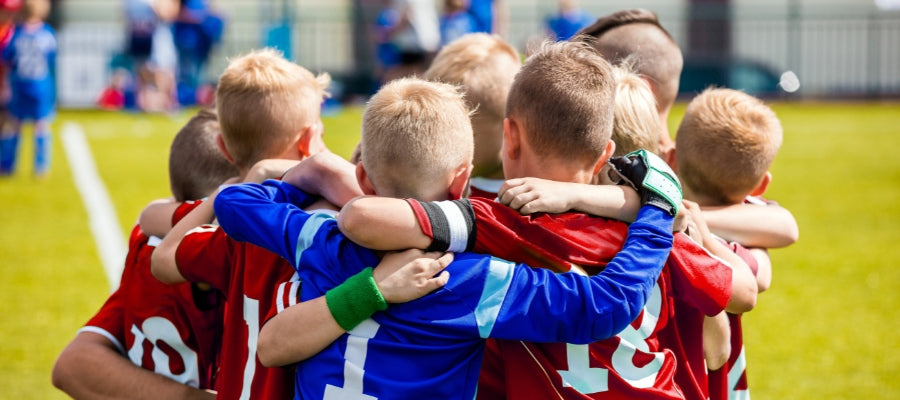Sport is not just about running faster, jumping higher, or scoring more points. They're about the journey of growing up, learning who you are, and how to work with others. Think of sports as the ultimate classroom, but without the desks and textbooks. It's where kids and teens learn some of life's most important lessons, not by studying, but by doing. This isn't just about getting fit or winning medals. It's about building character, learning the value of teamwork, and striving for personal bests.
Through this article, we'll dive into the real gold medals of youth sports - the life skills kids pick up on soccer fields, basketball courts, and swimming pools across the nation. These are the lessons that stick with them, shaping who they become, both in and out of the game.
Top 8 Life Lessons from Sport
The Value of Teamwork
It’s clear that one of the biggest takeaways from playing sports is teamwork. Imagine a group of kids on a soccer field or basketball court, figuring out that winning isn't just about one person shining but about how well they can work together. It's like a mini-society where every pass, strategy, and group effort shows that when people come together, they can achieve way more than they ever could solo. This lesson goes way beyond just playing games, it's a life skill that's gold in group projects at school, in future jobs, and even in family life.
Team sports are where kids see firsthand that everyone's different and that's a good thing. Each player brings something special to the game, and it's the mix of these unique talents that leads to amazing plays and victories. They learn pretty quickly that it's not just about me, me, me, but about us as a team.
And there's this incredible sense of belonging that comes from being part of a team. Kids learn to root for each other, share the highs of winning, and pick each other up when they're down. This sense of togetherness, of being in it together, often turns teammates into lifelong friends and teaches them the real power of community.
Team sports also give kids a crash course in leadership and how to be a good team player. They figure out that being a leader isn't just about calling the shots but about being responsible, setting a good example, and sometimes putting the team's needs before their own desires.
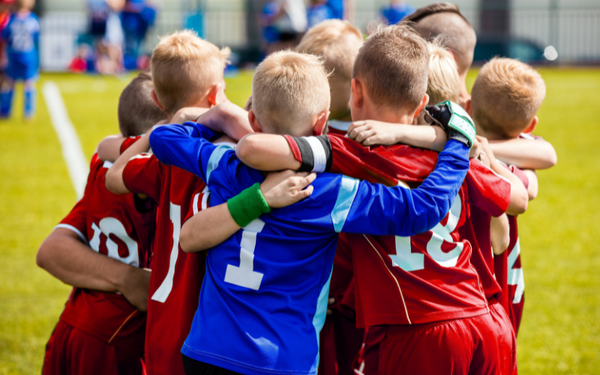
The Importance of Discipline and Commitment
Sport is an ultimate training ground, not just for the body but for character too. It's where kids learn that getting better at anything, whether it's hitting a baseball or acing a test, takes a whole lot of dedication and hard work.
Discipline in sports comes down to the choices kids make every day. It's about getting up early for practice, listening to their coach's advice, eating right, and making time to practice, practice, practice. This kind of structured life teaches them the real value of prioritizing and the art of sacrifice. It shows them that the road to success, no matter the destination, is paved with steady, consistent effort.
Then there's commitment. It's one thing to sign up for soccer or basketball; it's another to give it your all, even when you're not seeing immediate results, or when every muscle in your body aches. Sticking with it through the rough patches teaches young athletes about resilience. They learn that hanging in there, even when the going gets tough, is often what leads to triumphs, big and small.
What's more, sticking to a sport teaches kids that they're in charge of their own success. Realizing that their achievements are the direct result of their own sweat and effort gives them a sense of power over their future. This feeling, that they can shape their own destiny through hard work and persistence, is something they'll carry with them into every area of their lives.
And the cool thing is, the discipline and commitment learned on the field or in the gym don't just stay there; they spill over into schoolwork, hobbies, and personal goals. The skills of managing time, setting targets, and striving to be the best version of themselves are universal tools for success.
In short, sports are about so much more than winning games. They're about teaching young people how to win at life with grit, determination, and a strong character. These lessons in discipline and commitment are the real trophies, preparing kids to chase their dreams with everything they've got.
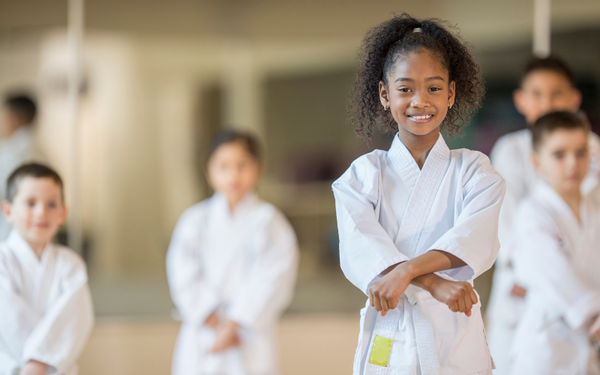
Learning to Handle Success and Failure
One of the most profound lessons sports teach young athletes is how to gracefully handle both success and failure. The competitive nature of sports inevitably leads to moments of triumph as well as disappointment, offering invaluable experiences that shape an individual's approach to life's ups and downs.
Success in sports, whether it's winning a game, improving a personal best, or mastering a new skill, provides a sense of achievement and validation. It reinforces the importance of hard work and dedication, showing young athletes that their efforts can lead to positive outcomes. Celebrating these successes teaches children to take pride in their accomplishments, fostering a healthy sense of self-esteem and confidence.
However, it's often through failure that the most enduring lessons are learned. Sports provide a safe context in which to experience setbacks, whether it's losing a match, facing a personal performance shortfall, or dealing with an injury. These experiences teach young athletes resilience—the ability to bounce back from disappointment and to view failure not as a defeat but as a learning opportunity. They learn that setbacks are a natural part of growth and can be catalysts for self-reflection, determination, and improvement.
Moreover, navigating success and failure in sports helps young individuals develop emotional intelligence. They learn to manage their feelings - joy, frustration, anger, and sadness in constructive ways. This emotional regulation is crucial for personal well-being and for building healthy relationships both on and off the field.
Sports also teach the value of perspective, helping young athletes understand that their self-worth is not solely determined by wins and losses. They learn to appreciate the journey - the effort, improvement, and camaraderie - as much as the outcome. This broader perspective encourages a balanced approach to competition, emphasizing effort and personal growth over external validation.

Developing Time Management Skills
Balancing the demands of training, competitions, academic responsibilities, and personal life requires careful planning and prioritization. This juggling act, while challenging, equips young individuals with time management skills that are invaluable throughout life.
Learning to allocate time efficiently is a crucial skill developed through sports. Athletes must figure out how to dedicate enough time to practice and improve in their sport while also fulfilling their academic obligations and maintaining a social life. This often involves making tough choices, such as waking up early for practice before school or using weekends for training sessions instead of leisure activities. Through these experiences, young athletes learn the importance of planning ahead and setting schedules that allow them to meet their varied commitments.
Sports also teach the value of prioritization. Athletes quickly learn that not all tasks are of equal importance and that focusing on what is most critical—whether it’s preparing for an important match or completing a key school project—is essential for success. This ability to prioritize helps young individuals not only in their athletic endeavors but also in managing their academic workload and personal responsibilities more effectively.
The discipline required to adhere to a training schedule fosters a sense of responsibility and self-reliance. Young athletes learn that managing their time well is a key factor in achieving their goals, both on the field and in the classroom. This self-discipline is a transferable skill that benefits them in various aspects of life, from pursuing higher education to navigating their future careers.
Effective time management also involves learning to say no to distractions and unnecessary commitments that can derail focus and productivity. Athletes develop the ability to distinguish between what is beneficial to their growth and what might hinder their progress, a discernment that serves them well beyond their sporting careers.
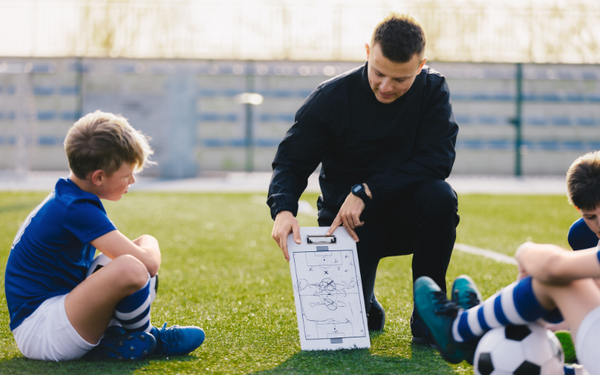
Building Self-Esteem and Confidence
The arena of sports is a powerful platform for young athletes to build self-esteem and confidence, two pillars of personal development that resonate far beyond the playing field. Through participation in sports, children and adolescents learn to trust in their abilities, embrace their strengths, and navigate their insecurities in a supportive and challenging environment.
Engagement in sports provides continuous opportunities for achievement, no matter how small. Every goal scored, every race completed, and every personal best achieved serves as a building block for self-esteem. These accomplishments, recognized and celebrated by coaches, teammates, and family members, reinforce a young athlete's sense of worth and competence. The positive feedback loop created by effort and acknowledgment encourages athletes to set higher goals and believe in their capacity to reach them.
Moreover, sports offer a unique context in which failure and challenges are inevitable parts of the journey. Learning to face these obstacles, to persist despite them, and to eventually overcome them is a profound exercise in building confidence. Young athletes discover that their value does not diminish with failure, and that courage and self-belief are key to bouncing back stronger. This realization fosters a resilient self-confidence that empowers them to take risks and push their boundaries, not only in sports but in all areas of life.
The development of skills and mastery over time in a chosen sport also contributes significantly to self-esteem and confidence. Witnessing their own progress, athletes gain a tangible sense of their growing abilities and potential. This sense of mastery, coupled with the discipline and dedication required to improve, bolsters their self-image and confidence in their power to effect change through hard work and persistence.
In essence, sports provide a fertile ground for young individuals to cultivate a healthy self-esteem and robust confidence. These attributes, once developed, become integral to their identity, guiding them through life's challenges with a positive self-image and the courage to strive for their dreams. The lessons of self-belief and self-respect learned through sports participation echo throughout their lives, shaping them into confident, resilient individuals ready to tackle whatever comes their way.

Encouraging Healthy Competition
Sports introduce young athletes to the concept of competition, teaching them how to strive for excellence while maintaining integrity and respect for others. This exposure to healthy competition is crucial, as it prepares them for the competitive aspects of life beyond sports, including academic achievements, career advancements, and personal goals.
Healthy competition in sports encourages athletes to push themselves to their limits, to constantly seek improvement, and to measure their progress against their peers. This drive to excel fosters a growth mindset, where the focus is on personal development rather than simply winning. Young athletes learn that true success comes from giving their best effort, setting personal records, and surpassing their previous performances.
Moreover, sportsmanship is a vital component of healthy competition. Athletes are taught to compete fiercely but fairly, to win with humility, and to accept defeat gracefully. They learn the importance of respecting opponents, officials, and the rules of the game, understanding that everyone's efforts contribute to the overall experience of the sport. This respect for the competitive process builds character and instills values that are applicable in all areas of life, such as honesty, integrity, and the ability to empathize with others.
Healthy competition also teaches young athletes how to handle pressure and manage emotions. Competing in sports requires them to perform under the watchful eyes of spectators, coaches, and teammates, often in high-stakes situations. This experience teaches them how to stay focused, calm, and composed, even when faced with stress or adversity. These skills are invaluable, as they translate directly to handling pressure in exams, job interviews, and other challenging life scenarios.
Experiencing competition in a supportive environment allows athletes to understand that competition can be a positive force for motivation and innovation. They learn that striving to be better, inspired by the achievements of others, can lead to personal and collective growth. This perspective on competition as a catalyst for improvement rather than a zero-sum game enriches their approach to challenges, encouraging collaboration and mutual respect.
Healthy competition in sports offers a balanced approach to striving for success, emphasizing personal growth, respect for others, and emotional resilience. These lessons equip young athletes with a healthy competitive spirit, preparing them for the inevitable competitions they will face in life, with the confidence and integrity to pursue their goals in a constructive and positive manner.
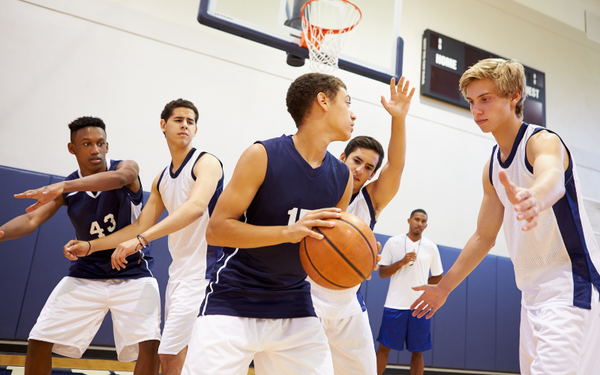
The Significance of Respect and Sportsmanship
The values of respect and sportsmanship are among the most enduring lessons imparted through participation in sports. These principles guide young athletes in their interactions on and off the playing field, promoting a culture of dignity, appreciation, and mutual understanding. Learning to honor opponents, teammates, coaches, and officials, regardless of the outcome of a game, lays the foundation for a lifetime of respectful relationships and ethical behavior.
Respect in sports transcends mere politeness; it encompasses a genuine acknowledgment of the effort, dedication, and vulnerability of all participants. Athletes learn to appreciate the hard work that everyone contributes to the sport, recognizing that each player, coach, and referee is striving to do their best under the pressures of competition. This appreciation fosters a supportive environment where individuals feel valued and motivated to pursue excellence.
Sportsmanship extends the concept of respect further, embodying the ideals of fair play, grace in victory or defeat, and the spirit of camaraderie. Good sportsmanship teaches young athletes to compete with honor, to accept decisions without dissent, and to offer encouragement to teammates and respect to adversaries. These behaviors highlight the importance of the journey and the experience over the mere outcome of a match or season.
Moreover, learning to handle interactions with grace and respect, even in the heat of competition, equips young athletes with essential social skills. They develop the ability to navigate disagreements, to communicate effectively, and to resolve conflicts constructively. These skills are invaluable in all areas of life, from personal relationships to academic and professional settings, where teamwork and collaboration are often key to success.

Fostering Lifelong Health and Wellness
Participation in sports from an early age sets the stage for a lifetime commitment to health and wellness. The physical activities involved in sports not only improve fitness in the short term but also instill habits and attitudes that encourage a healthy lifestyle well into adulthood. This aspect of sports education is crucial, as it addresses the growing concerns over sedentary lifestyles and their associated health risks.
Engaging in sports teaches young athletes about the importance of physical activity for maintaining a healthy body. Regular exercise through sports improves cardiovascular health, strengthens muscles, enhances flexibility, and can positively impact mental health by reducing stress and anxiety. These physical benefits, experienced firsthand, help young individuals understand the value of staying active and motivate them to prioritize their physical well-being.
Sports participation often comes with guidance on nutrition and the role of a balanced diet in supporting athletic performance and overall health. Athletes learn to make informed choices about what they eat, understanding how nutrition fuels their bodies for both sports and everyday activities. This awareness of the connection between diet, exercise, and health is a vital lesson that supports lifelong wellness.
In addition to the direct health benefits, sports offer a framework for setting and achieving fitness goals. This goal-oriented approach encourages a proactive stance toward health, where individuals are empowered to take control of their physical well-being. The discipline and commitment developed in sports can inspire athletes to maintain regular exercise routines, engage in new physical activities, and avoid unhealthy habits as they grow older.
In fostering lifelong health and wellness, sports play a pivotal role in teaching young individuals that physical activity is not just a means to an end but a valuable and enjoyable part of a balanced life. The lessons learned through sports participation - about the importance of regular exercise, nutrition, goal setting, and enjoying physical activity - lay the foundation for a healthy lifestyle that can lead to a longer, happier, and more fulfilling life.

Sport is More than Just an Activity
The journey through youth sports is about much more than the games played or the skills acquired, it is a transformative experience that imparts vital life lessons, shaping young individuals into well-rounded, resilient, and ethical members of society. As we have explored the multifaceted lessons learned from playing sports - ranging from the value of teamwork and the importance of discipline and commitment, to handling success and failure, developing time management skills, building self-esteem and confidence, encouraging healthy competition, understanding respect and sportsmanship, and fostering lifelong health and wellness - it becomes clear that sports are a powerful vehicle for personal development.
These lessons extend far beyond the playing field, influencing every aspect of a young athlete's life. The discipline and dedication honed in sports translate into academic and professional achievements; the resilience and emotional intelligence developed through competition equip them to navigate life's challenges; the commitment to health and wellness instilled by regular physical activity promotes a lifetime of well-being; and the principles of respect, fairness, and empathy foster meaningful relationships and community engagement.
The lessons kids learn from playing sports are invaluable treasures that enrich their lives in immeasurable ways. These lessons lay the groundwork for a future where success is measured not just by trophies and records, but by character, integrity, and the positive impact one has on the world. Through sports, young athletes embark on a journey of self-discovery and personal excellence, armed with the skills, values, and attitudes that will guide them through the game of life.

